If you’re looking to boost your money management skills in 2025, I recommend checking out a mix of timeless classics and practical guides. Books like *The Psychology of Money* and *Think and Grow Rich* focus on mindset and behavioral habits, while titles like *Total Money Makeover* and *The Financial Peace Planner* offer step-by-step strategies. To stay organized, a budget planner like ZICOTO can be a great addition. Keep exploring, and you’ll discover even more tools to help you succeed.
Key Takeaways
- Focus on timeless classics like *Think and Grow Rich* and *The Total Money Makeover* for foundational financial principles.
- Include behavioral finance books such as *The Psychology of Money* to improve mindset and emotional control.
- Select practical guides like *The Financial Peace Planner* and *ZICOTO Budget Planner* for actionable money management tools.
- Incorporate modern topics like cryptocurrency and investment strategies relevant for 2025 financial trends.
- Ensure books are suitable for your experience level and align with your personal financial goals and values.
The Psychology of Money: Timeless lessons on wealth, greed, and happiness

Are you looking for a financial book that goes beyond numbers and formulas to explore the real reasons behind our money decisions? “The Psychology of Money” is an excellent choice if you want to understand how behavior, emotions, and mindset influence wealth and happiness. The book emphasizes that doing well with money depends more on behavior than knowledge, highlighting the importance of psychological factors like ego, pride, and personal history. It introduces key ideas like the Margin of Safety, promoting frugal living and patience. Overall, it teaches that long-term success comes from disciplined habits, managing risk, and understanding the human side of finance.
Best For: individuals seeking to understand the psychological and behavioral aspects of money management to achieve long-term wealth and happiness.
Pros:
- Provides timeless lessons on the importance of behavior, mindset, and emotional intelligence in finance
- Emphasizes practical strategies like frugal living, patience, and risk management supported by real-world stories
- Accessible and engaging, making complex financial concepts understandable for beginners and experienced investors alike
Cons:
- Focuses more on behavioral insights than detailed technical financial strategies
- May underemphasize the importance of market-specific knowledge and quantitative analysis
- Some readers might find the concepts broad and less actionable without additional financial planning tools
The Total Money Makeover Book

If you’re looking for a straightforward, practical guide to eliminate debt and build financial security, “The Total Money Makeover” by Dave Ramsey is an excellent choice. I found it incredibly helpful for breaking down complex financial concepts into simple, actionable steps. Ramsey’s proven methods, like the debt snowball and emergency fund, made it easier for me to stay disciplined and motivated. The book emphasizes personal responsibility and habits that lead to long-term stability. Its no-nonsense tone keeps you focused, whether you’re drowning in debt or just starting to plan for the future. I recommend it to anyone ready to take control of their finances.
Best For: individuals seeking a clear, practical plan to eliminate debt, build savings, and achieve long-term financial security.
Pros:
- Provides a straightforward, step-by-step approach that is easy to follow.
- Emphasizes personal responsibility and disciplined habits for lasting financial change.
- Includes practical tools and worksheets to help implement strategies effectively.
Cons:
- The tone can be blunt and may not appeal to everyone’s communication style.
- Focuses heavily on debt reduction, which may overlook other financial goals for some readers.
- Some financial concepts might be too simplified for advanced investors or those with complex financial situations.
ZICOTO Monthly Budget Planner with Expense Tracker (12 Months)
The ZICOTO Monthly Budget Planner with Expense Tracker is an ideal choice for anyone seeking a straightforward, portable tool to manage their finances over an entire year. Its minimalistic design keeps things simple, focusing on clarity and ease of use. The undated format means you can start whenever, fitting easily into your bag for on-the-go tracking. It covers essential areas like income, expenses, savings, and debts, with dedicated sections for goals and reviews. Plus, the motivational quotes and stickers make budgeting more engaging. Made from quality materials, it’s praised by users for its all-encompassing layout and portability, making financial management less stressful.
Best For: those seeking a portable, easy-to-use, and comprehensive financial planner to manage their income, expenses, savings, and debts over an entire year with motivational support.
Pros:
- Minimalistic and modern design enhances clarity and ease of use
- Undated format allows flexible start times and continuous use
- Includes stickers, quotes, and planning tools to boost engagement and motivation
Cons:
- Limited to a 12-month span, requiring replacement for long-term tracking
- May lack advanced financial features like investment tracking or detailed analytics
- Slightly smaller size might not accommodate extensive note-taking for some users
Think and Grow Rich Book

For anyone seeking a timeless and proven roadmap to wealth and success, “Think and Grow Rich” stands out as an essential read. As the bestselling success book of all time, it distills Napoleon Hill’s success principles, drawing on stories of icons like Carnegie, Edison, and Ford. The revised edition updates these lessons with modern examples from Bill Gates and Mary Kay Ash, making the concepts relevant today. Hill emphasizes mindset and habits vital for achievement, offering practical insights that have influenced countless entrepreneurs. This book’s enduring legacy proves its principles remain powerful tools for building wealth and personal success in 2025 and beyond.
Best For: individuals seeking a timeless and practical guide to achieving wealth and success through proven principles and mindset development.
Pros:
- Provides foundational success principles that are applicable across generations.
- Incorporates both historical and modern success stories to illustrate concepts.
- Easy to understand language and engaging anecdotes make it accessible for a wide audience.
Cons:
- Some examples and terminology may feel outdated despite updates.
- Focuses heavily on mindset, which may require additional action to see tangible results.
- As a classic, it may lack specific step-by-step strategies for certain modern challenges.
End of Life Planner with Tabs and Large Print

Designed with seniors and adults in mind, the End of Life Planner with Tabs and Large Print makes organizing final arrangements straightforward. Its large print on non-bleed paper guarantees easy readability, while 16 detailed sections cover personal info, medical details, property, finances, and final wishes. The spiral binding allows effortless page turns, and the compact size fits comfortably on a shelf or desk. Features like a durable vinyl cover, inner pocket, pen holder, and elastic band keep everything organized. This planner provides peace of mind by clearly documenting important details, making it easier for loved ones to honor your wishes during difficult times.
Best For: seniors and adults seeking a comprehensive, easy-to-read organizer to document final arrangements and important personal, medical, financial, and legal information.
Pros:
- Large print and non-bleed paper enhance readability for users with visual impairments.
- Thoughtfully organized into 16 detailed sections for thorough documentation.
- Durable design with vinyl cover, spiral binding, and protective features ensures longevity and easy use.
Cons:
- Slightly heavier weight (14.9 ounces) may be less portable for some users.
- Limited to printed format, lacking digital or online backup options.
- Price may be higher compared to simpler or less feature-rich organizers.
The Simple Path to Wealth Book on Financial Independence
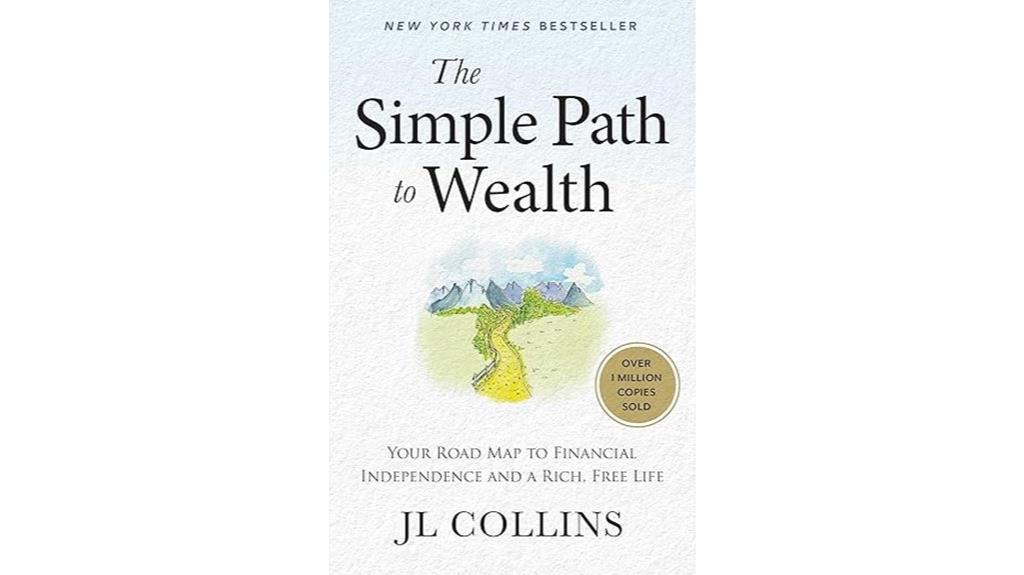
If you’re looking for a straightforward, no-nonsense guide to achieving financial independence, “The Simple Path to Wealth” is an excellent choice. This expanded 2025 edition, a bestseller featured on Hasan Minhaj Doesn’t Know, offers a clear, practical blueprint that demystifies wealth-building. Authored by the “Godfather of Financial Independence,” it emphasizes simple, proven strategies over market timing or stock picking. The book encourages focusing on financial freedom rather than consumerism, with actionable advice on debt, investing, and retirement. Collins’ direct style makes complex concepts accessible, empowering you to take control of your financial future and live life on your own terms.
Best For: individuals seeking a straightforward, practical approach to achieving financial independence without complex investment strategies or market timing.
Pros:
- Clear, easy-to-understand guidance suitable for beginners and experienced investors alike
- Emphasizes simplicity and proven strategies over market speculation
- Updated content with recent data, FAQs, and actionable tools to aid implementation
Cons:
- May oversimplify some investment nuances for advanced investors
- Focuses primarily on individual financial strategies, less on broader economic factors
- Some readers might find the irreverent style less formal or traditional in tone
The Wealth Ladder: Proven Strategies for Every Step of Your Financial Life
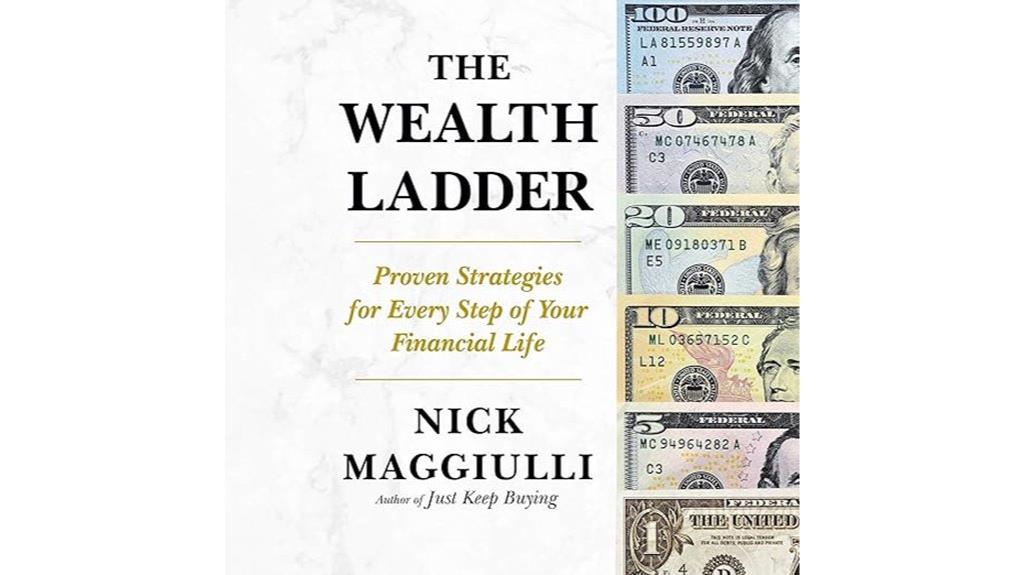
Anyone feeling stuck in their financial journey despite putting in effort will find “The Wealth Ladder” especially helpful. This book offers a clear framework for progressing at every stage of your financial life, emphasizing that success isn’t about working harder but smarter. It breaks down wealth into six levels, each requiring tailored strategies for managing spending, income, and investments. By applying the right approach at the right time, you can reduce stress, make smarter decisions, and steadily climb upward. It’s not a get-rich-quick scheme but a practical guide to adapting your strategies as your financial situation evolves.
Best For: individuals seeking a tailored, step-by-step approach to building wealth and overcoming financial stagnation at any stage of their financial journey.
Pros:
- Provides a clear, structured framework dividing wealth into six levels for targeted strategy application.
- Emphasizes adaptable, smart decision-making over simply working harder, aligning with evolving financial circumstances.
- Includes practical resources like downloadable PDFs to support implementation and understanding.
Cons:
- May require readers to invest time in understanding and applying strategies specific to each level.
- Not a quick fix or a one-size-fits-all solution, which might be less appealing for those looking for rapid results.
- The focus on tailored strategies might be complex for individuals seeking straightforward, simple advice.
Rich Dad Poor Dad Book: Money Lessons for Kids
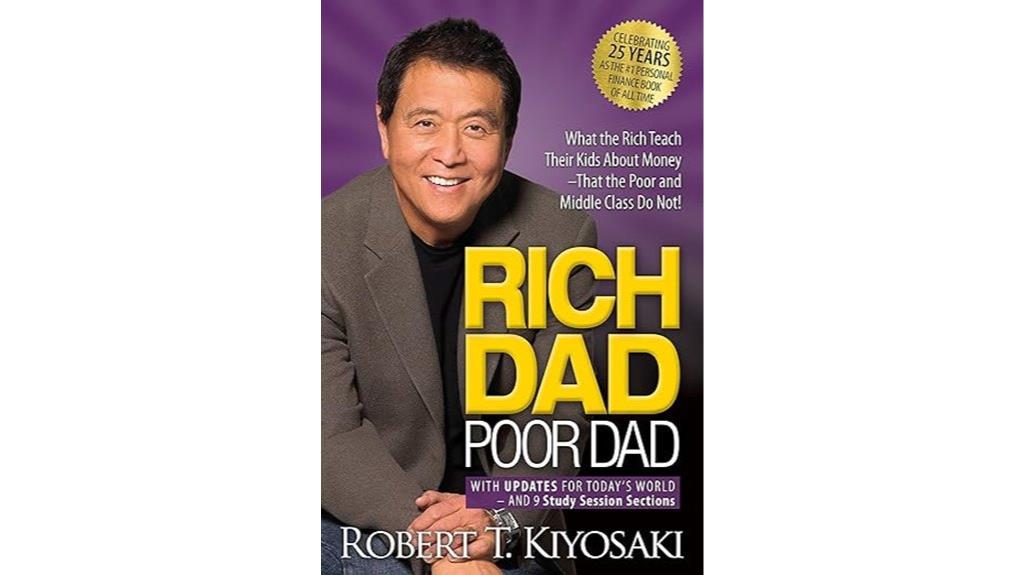
Rich Dad Poor Dad: Money Lessons for Kids is an excellent choice for parents and educators seeking to introduce children to fundamental financial principles early on. This book, celebrating its 25th anniversary, remains the world’s top personal finance bestseller, translated into 38 languages with over 40 million copies sold. It challenges myths about wealth, emphasizing the importance of assets and financial education. By contrasting two different mindsets toward money, it teaches kids that earning more isn’t the only path to wealth—smart investing and understanding money’s role are key. The lessons foster a mindset of financial independence that stays relevant, even as technology and markets evolve.
Best For: parents, educators, and guardians seeking to introduce children to essential financial principles early, fostering financial literacy and independence.
Pros:
- Simplifies complex financial concepts into engaging lessons for kids
- Promotes a mindset of financial independence and smart investing
- Celebrates a 25-year legacy of proven financial education principles
Cons:
- May require adult guidance to fully grasp and explain concepts to children
- Focuses primarily on foundational principles, less on advanced financial strategies
- Might not address cultural or regional differences in financial practices
The Little Book of Common Sense Investing

Are you looking for a straightforward, evidence-based approach to investing that emphasizes simplicity and long-term growth? “The Little Book of Common Sense Investing” is an ideal choice for those who want to cut through the noise of active management and focus on low-cost, passive index fund strategies. Jack Bogle, the founder of Vanguard, highlights how buying and holding broad market index funds can outperform most active managers over time. He stresses minimizing expenses, taxes, and emotional investing to protect wealth. The book offers practical advice on asset allocation, diversification, and disciplined investing, making it a must-read for anyone seeking reliable, long-term financial growth.
Best For: investors seeking a simple, evidence-based, long-term passive investing strategy that minimizes costs and maximizes returns through broad market index funds.
Pros:
- Emphasizes low-cost, passive index fund investing which often outperforms active management over time
- Promotes disciplined, buy-and-hold strategy reducing emotional and costly trading mistakes
- Provides clear, practical advice on asset allocation, diversification, and tax efficiency
Cons:
- Offers limited guidance on active management or sector-specific investing
- Less emphasis on complex asset allocation strategies for advanced investors
- Might not fully address markets where active management could yield short-term outperformance, such as emerging markets
Personal Finance For Dummies
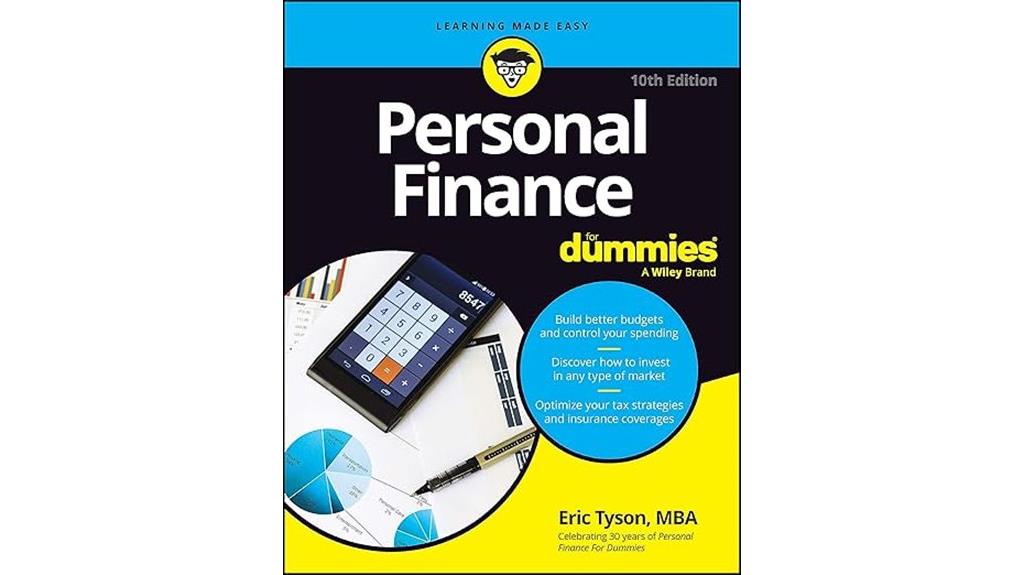
Personal Finance For Dummies is an excellent starting point for anyone enthusiastic to improve their understanding of money management. I’ve seen how it promotes financial literacy by breaking down core concepts like earning, saving, investing, and protecting assets. The book emphasizes setting realistic goals, controlling spending, and building a solid financial plan, no matter your current situation. It also covers modern topics such as steering the housing market and evaluating new investments like cryptocurrency. With practical strategies and clear advice, this book helps you make informed decisions, safeguard your wealth, and develop confidence in managing your finances for a secure future.
Best For: Beginners and individuals seeking a comprehensive, easy-to-understand guide to improve their financial literacy and make informed money management decisions.
Pros:
- Covers essential personal finance topics with clear explanations suitable for all levels.
- Includes modern financial concerns like cryptocurrency and housing market strategies.
- Offers practical advice on budgeting, saving, investing, and protecting assets to achieve financial stability.
Cons:
- May lack in-depth analysis for advanced investors or those with complex financial situations.
- Focuses on foundational concepts, possibly requiring supplementary resources for detailed investment strategies.
- Some readers might find the general advice too broad for highly specific financial planning needs.
Dave Ramseys Complete Guide To Money

If you’re new to managing money or looking for a straightforward, all-in-one resource, “Dave Ramsey’s Complete Guide to Money” is an excellent choice. It offers practical advice on budgeting, saving, eliminating debt, and investing, making complex concepts accessible. The book emphasizes core principles like the Baby Steps, helping you build a solid financial foundation through disciplined habits. It also covers essential skills such as negotiating, choosing mortgage options, and understanding insurance. Plus, Ramsey highlights the importance of giving, showing how generosity can enhance your financial peace. This guide is perfect for beginners or anyone wanting a thorough, easy-to-follow reference on personal finance.
Best For: beginners or anyone seeking a comprehensive, easy-to-understand guide to personal finance and money management.
Pros:
- Provides practical, step-by-step advice grounded in proven financial principles like the Baby Steps
- Covers a wide range of topics including budgeting, saving, debt elimination, investing, and insurance
- Emphasizes the importance of giving and generosity as part of financial well-being
Cons:
- May contain familiar material for those who have already completed Ramsey’s Financial Peace University
- Lacks in-depth analysis of complex investment strategies for advanced investors
- Some readers might find the focus on Ramsey’s specific philosophies limiting if they prefer alternative financial approaches
The Richest Man in Babylon (Readers Library Classics)

For anyone seeking timeless financial wisdom, The Richest Man in Babylon (Readers Library Classics) offers simple yet powerful lessons rooted in ancient parables. Written by George S. Clason in the early 1920s, this book uses stories set in ancient Babylon to teach fundamental money principles. It emphasizes that wealth comes from understanding basic laws of money, practicing discipline, and making wise investments. Since its publication in 1926, it’s become a classic, inspiring millions with straightforward advice on financial health. I find its timeless lessons invaluable, especially in today’s complex world, reminding me that sound money habits never go out of style.
Best For: individuals seeking timeless financial wisdom and foundational principles to improve their money management skills.
Pros:
- Offers simple, easy-to-understand lessons rooted in ancient parables that are applicable today.
- Emphasizes discipline, wise investing, and understanding fundamental laws of wealth accumulation.
- Widely regarded as a classic personal finance resource that has inspired millions over nearly a century.
Cons:
- Uses historical and allegorical storytelling that may feel outdated or less engaging for some readers.
- Lacks detailed modern financial strategies or specific investment advice.
- Might be too simplistic for those seeking advanced or comprehensive financial planning guidance.
Budget Planner, Expense Tracker & Finance Organizer Notebook

Looking for a budget planner that simplifies managing your finances without overwhelming you? The Budget Planner 2025-2026 is an undated monthly book designed to keep your money organized. It features full-page calendars, goal-setting sections, debt and bill trackers, and savings goals. Bonus stickers, pie charts, reflection questions, and checklists make it engaging and customizable. Its durable water-resistant cover, elastic band, and extra storage keep it practical for daily use. With a user-friendly layout and helpful tips, it suits beginners and experienced budgeters alike. This all-in-one organizer makes tracking income, expenses, and financial goals straightforward and motivating.
Best For: individuals seeking a comprehensive, user-friendly budget planner that simplifies financial management for both beginners and experienced budgeters.
Pros:
- Includes full-page monthly calendars, goal-setting sections, and trackers for debts, bills, and savings, offering a complete financial overview.
- Features bonus stickers, pie charts, reflection questions, and checklists that enhance customization and engagement.
- Durable water-resistant cover with an elastic band and extra storage pocket, making it practical for daily use and portability.
Cons:
- Pages are thin and may tear easily when removing stickers, which could affect durability over time.
- As an undated planner, it requires users to fill in dates, which may be inconvenient for some.
- Slightly limited space per month might be restrictive for users with extensive financial tracking needs.
I Will Teach You to Be Rich Book (Second Edition)
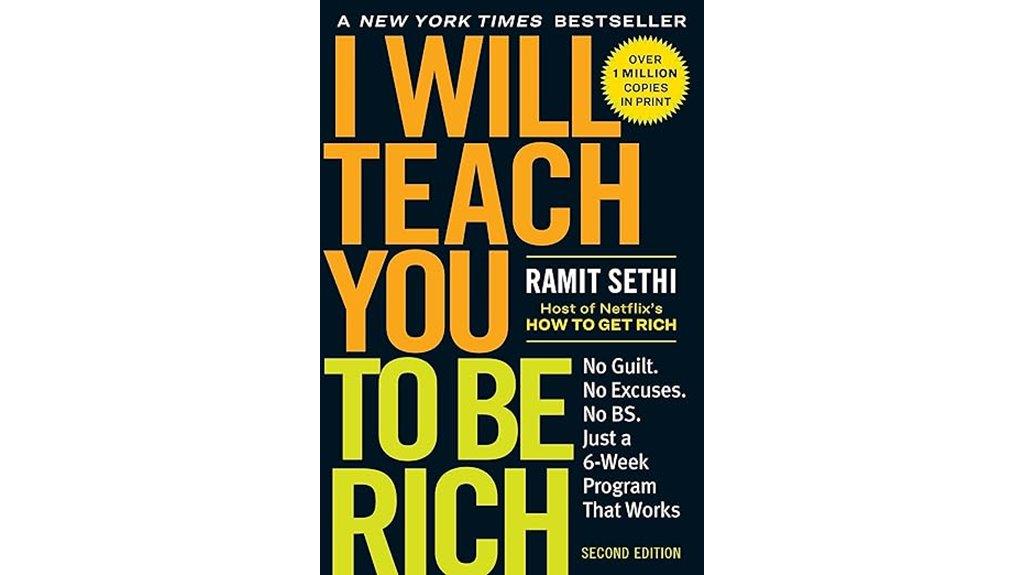
The second edition of “I Will Teach You to Be Rich” is an ideal choice for individuals who want a practical, straightforward approach to improving their finances without getting bogged down in complex theory. Updated for its 10th anniversary, it offers a proven 6-week program with new tools, insights, and success stories. Ramit Sethi emphasizes automating your finances, choosing the right accounts, and implementing simple investment strategies that outperform traditional advice. The book also guides you through managing major expenses and negotiating better deals. It’s a total, no-nonsense guide to mastering your money, reducing stress, and living a richer, more intentional life.
Best For: individuals seeking a practical, no-nonsense guide to improving their financial habits through automation, smart investing, and effective expense management.
Pros:
- Provides a clear, 6-week actionable program suitable for beginners and experienced savers alike.
- Emphasizes automation and simple investment strategies that outperform traditional financial advice.
- Includes updated tools, insights, and success stories that motivate and guide readers toward financial mastery.
Cons:
- May oversimplify complex financial topics for those looking for in-depth technical analysis.
- Focuses heavily on automation and may not address all nuanced personal financial situations.
- Some readers might find the scripting and negotiation tips less applicable to more complex or unique financial scenarios.
The Financial Peace Planner

If you’re seeking a straightforward, faith-based approach to regain control of your finances, “The Financial Peace Planner” offers practical guidance tailored for individuals willing to commit to small, consistent steps. I found this workbook-style guide easy to follow, with clear exercises and forms that help assess my budget, track expenses, and plan debt repayment. Ramsey’s no-nonsense advice emphasizes disciplined spending, eliminating materialism, and building savings. The step-by-step approach, typically one chapter per week, made it manageable. For anyone wanting to establish financial stability rooted in faith and practicality, this book provides hope, motivation, and real tools to transform your money habits.
Best For: individuals seeking a practical, faith-based, step-by-step guide to regain financial control through disciplined habits and simple tools.
Pros:
- Offers clear, straightforward exercises and templates that facilitate budgeting, expense tracking, and debt repayment.
- Emphasizes disciplined spending, savings, and eliminating materialism, promoting lasting financial habits.
- Motivational tone combined with practical advice makes it accessible for readers at any debt level or financial awareness stage.
Cons:
- Some content and investment advice may feel outdated, especially regarding mutual funds and modern financial tools.
- The workbook-style format requires consistent effort and commitment, which may be challenging for some individuals.
- As a faith-based approach, it may not fully resonate with readers seeking a purely secular financial guide.
Factors to Consider When Choosing Financial Planning Books

When selecting financial planning books, I consider who the book is aimed at to make sure it matches my experience level. I also look at the author’s expertise and whether the book offers practical advice I can apply to my situation. Finally, I check if it covers relevant investment strategies and behavioral insights to help me make informed decisions.
Target Audience Focus
Choosing the right financial planning book depends heavily on understanding your current knowledge level and specific needs. I recommend first considering whether the book is tailored for beginners, intermediate investors, or advanced planners to *guarantee* it matches your expertise. Think about your demographic—are you a young adult, retiree, or high-net-worth individual? Different groups face unique financial challenges, like student debt or estate planning. Also, assess if the tone and style—motivational, technical, or practical—fit your learning preferences and personality. *Finally*, check if the content aligns with your stage in life or financial goals, such as saving for education, planning retirement, or building wealth. Selecting a book that resonates with your audience ensures the advice is relevant and actionable.
Author Expertise Level
How important is an author’s professional background when selecting a financial planning book? I believe it’s essential. An author with solid credentials in finance or related fields signals they possess credible, well-founded knowledge. Practical experience, like working in investment or banking, further boosts their reliability, ensuring advice isn’t just theoretical. I also look for authors recognized by reputable industry awards or those who’ve published multiple works, as this demonstrates expertise and dedication. Equally important is matching the author’s knowledge level to my own—be it beginner, intermediate, or advanced—so I can learn effectively without feeling overwhelmed or under-challenged. Ultimately, I appreciate clear communication; a good author should simplify complex concepts and make them accessible, regardless of my familiarity with the topic.
Practical Application Value
Have you ever struggled to turn financial advice into real results? That’s where practical application value comes in. The best books offer strategies that are actionable, easy to implement, and lead to measurable improvements like debt reduction or increased savings. Look for books with worksheets, templates, or step-by-step exercises that guide you through tasks such as budgeting or debt elimination. The most effective ones also provide tools adaptable to different financial situations and levels of expertise. When advice is rooted in proven principles and backed by data, you can confidently apply it to your personal circumstances. Ultimately, a book’s true value is reflected in tangible results reported by readers—making practical application the key factor in choosing the right financial planning resource.
Investment Strategies Covered
When evaluating financial planning books for investment strategies, it’s crucial to take into account how well they emphasize diversification, cost control, and alignment with your long-term goals. I look for books that advocate passive index fund investing, which has proven to outperform active management over decades. Understanding asset allocation is essential—balancing risk and reward based on my risk tolerance, time horizon, and market conditions. A solid plan should include safety margins and disciplined rebalancing to handle market fluctuations. I prioritize strategies that focus on low-cost, tax-efficient investments, emphasizing patience and consistency rather than market timing. These elements ensure my investments remain aligned with my goals, helping me build wealth steadily without chasing quick gains or taking unnecessary risks.
Behavioral Insights Included
Ever wonder why even the most well-informed investors sometimes make poor financial choices? It’s often because of behavioral biases that influence our decisions, beyond pure logic. Financial books that include behavioral insights help us understand these tendencies—like overconfidence, loss aversion, or herd mentality—that can lead to costly mistakes. I’ve found that stories and real-life examples make these concepts easier to grasp and relate to my own habits. Recognizing how ego, pride, or marketing sway my choices allows me to think more critically and avoid unnecessary spending or risky investments. Books emphasizing behavioral insights stress the importance of self-awareness, discipline, and mindset shifts. These lessons are essential for developing sustainable financial habits, making better decisions, and ultimately boosting my money management skills.
Complexity and Accessibility
Choosing the right financial planning book can feel overwhelming, but focusing on clarity and accessibility makes the process much easier. I recommend selecting books with straightforward language so you can grasp concepts regardless of your financial background. Look for titles that offer practical, actionable advice instead of dense theories that are hard to implement. Visual aids, worksheets, and summaries are helpful tools that make complex ideas easier to understand and apply. It’s also important to choose books tailored to your current financial situation and learning style—whether you’re a beginner or more advanced. The best options strike a balance, providing enough depth without overwhelming you with jargon or complicated strategies. Prioritizing simplicity and clarity guarantees you can confidently put your new knowledge into practice.
Up-to-Date Content
How can you guarantee a financial planning book stays relevant in today’s fast-changing economic landscape? The key is to look for books that include recent financial data, trends, and updated strategies aligned with current conditions. Check if the edition has been revised recently to incorporate new regulations, investment options, and digital tools like online banking and cryptocurrencies. Verify that the content reflects recent tax law changes, market behaviors, and technological advances, ensuring advice isn’t outdated. Always review publication dates and seek books with recent updates. Contemporary financial challenges demand current knowledge, so choosing a book that addresses these issues ensures your strategies are effective and reliable. Staying up-to-date with the latest financial information is essential for making informed decisions today and in the future.
Frequently Asked Questions
How Do These Books Cater to Different Financial Literacy Levels?
These books cater to different financial literacy levels by offering a range of beginner-friendly guides and more advanced strategies. I find that they start with fundamental concepts, making them accessible for newcomers, then gradually introduce complex topics for seasoned learners. Whether you’re just starting out or looking to deepen your understanding, these books provide tailored insights to match your current knowledge, helping you grow confidently in your financial journey.
Are the Strategies in These Books Applicable Globally?
Think of these strategies as a universal map guiding us through financial terrain. Yes, they’re applicable globally, but with local landmarks in mind. I find that core principles like budgeting and investing adapt well across borders, though cultural nuances may influence how we apply them. So, while the tools are versatile, customizing them to your environment makes all the difference in making your financial journey successful.
Which Books Focus on Investing Versus Budgeting?
If you’re looking to distinguish between investing and budgeting, I recommend “The Intelligent Investor” by Benjamin Graham for investing insights and “The Total Money Makeover” by Dave Ramsey for budgeting strategies. I personally find that these books offer clear, practical advice tailored to different financial goals. Whether you’re aiming to grow wealth or manage expenses, these titles equip you with the knowledge you need to succeed in both areas.
Do These Books Include Practical Exercises or Action Plans?
Yes, many of these books include practical exercises and action plans. I find that applying their advice through step-by-step worksheets, budgeting templates, and goal-setting activities really helps me improve my money management skills. They’re not just theory; they encourage me to take concrete steps. If you’re serious about boosting your financial skills, look for books that offer actionable strategies and exercises—you’ll see real progress.
How Often Should I Revisit These Books to Update My Knowledge?
I recommend revisiting these books annually, balancing routine updates with fresh insights. While financial markets evolve quickly, foundational principles stay steady, so a yearly review helps me stay aligned with current trends and strategies. Sometimes, I revisit specific chapters when new financial tools or legislation emerge, ensuring I stay proactive. Regular reflection keeps my skills sharp and my money management strategies effective, so I stay confident in my financial future.
Conclusion
If you’re serious about transforming your financial future, these books are your secret weapons—think of them as the GPS guiding you through the maze of money management. Each one offers invaluable insights that can turn your financial chaos into clarity. Plunge in, stay committed, and watch your wealth grow faster than you ever imagined. Your journey to financial mastery starts here—are you ready to change your life forever?










